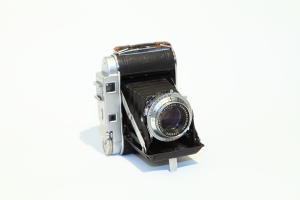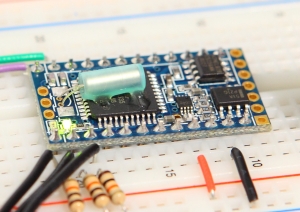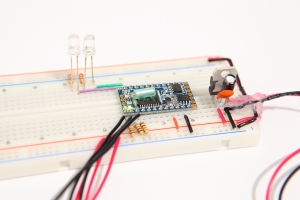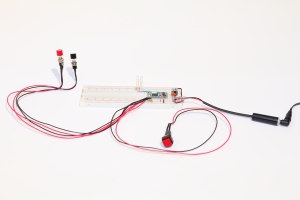Projects
Camera Shutter Tester
Sun, Mar 28th, 2010 - Project Status: Open

One of my slow shutter cameras
One of my more recent hobbies has been tinkering with microcontrollers. I've jumped on the Arduino bandwagon and have been enjoying the ride. I have also been experimenting with the BX-24 and decided that for my camera shutter tester I would use it.
There were a few factors that were immediately apparent when I first thought of how I would build the shutter tester: size, power, sensor input and data output. I decided the tester should fit into the camera's film compartment and measure the light when the shutter opened. This made the size of the tester a major concern. The BX-24 is about the size of a postage stamp but I definately still need to choose the additional parts that will make up the tester wisely. I plan to use battery power to power the tester but currently have no detailed plans regarding this matter. Data input will no doubt be initiated by some form of light sensor. Since almost all of the shutter speeds are measured in fractions of a second I will need a fast sensor. I don't believe the typical photoresistor will be fast enough so I plan to use either a photodiode or phototransistor. They are usually used as digital input sensors but I believe you can get an analog reading from them if needed. Once the tester measures the light, I need to be able to view the results. All sensor readings I have done thus far while tinkering with the BX-24 have displayed the results on my computer via a serial cable and the Windows program Hyperlink. For this project though I will need to either use a wireless system or record the data on the microcontroller and view it when the tester is removed from the camera via a serial cable. I'm still weighing my options on this matter.
Recently, a coworker informed me of a timer project he has been working on to use at quick-draw competitions. In short, he wanted a random delay before the timer started and when a target was hit the timer would stop and record the results. After hearing the details of his plan, I concluded that what he wanted to do could be done with the BX-24. I put together a simple prototype which used two momentary switches which represented the target sensors and an additional switch to start the timer sequence. I programmed the BX-24 to count a random amount of seconds between one and six and then start the timer. When one of the target switches was closed the timer would stop. I used the BX-24's serial output to display the results on my laptop. The results included which sensor (switch) stopped the timer and how much time it took to do this. What I didn't realize at the time was that I made a game my young daughter would love. With one switch in her hand and one in my hand it was a game to see which one could stop the timer faster once the green 'Go' LED lit up. I plan to box-up the game and refine it a bit for us to play.
Like the timer game I made, the shutter tester will use a sensor to start and stop the BX-24's own timer. As explained previously, this will be accomplished via a light sensor. My next step for this project will be to replace the momentary switches of the timer game with a light sensor and analyze the results. If I am successful with this I will focus on how I will record or display the data. I will post more about this project as I work on it. Feel free to contact me with any feedback, questions or advice.
Project Images
One of my collection Close up of BX-24 microcontroller BX-24 timer circuit My Homemade Timer Game


